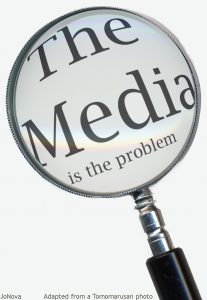Much of the Media’s true business model is probably not ads or customers or even profits. Controlling the narrative is power in itself. Those who hold the strings that give a party or candidate a ten point advantage, to some extent, control the party.
If it serves an industry to get one candidate elected, those that control the megaphone can describe said candidates flaws with the best possible spin, or not at all. If this is the major driver of media ownership it explains the Fox paradox. Tucker Carlson and Fox are scoring super high ratings, and competing on uncontested territory. Why does no one seems to want to mimic that and compete for those viewers?
Probably because Big Business doesn’t want “Power for The People” or small government or, euwh, competition.
So Big Business owns Big Media, and they both like Big Government. Nearly every big business benefits from big regulation by “friendly” regulators. They get a net of red tape that catches little fish competitors and a river of subsidies that make life sweeter for Big Fish.
And if Big Media hold the key to swing voters, then Big Government likes Big Media, so it’s a perpetual self feeding circle. The media effectively becomes an arm of the left wing large government parties. It’s all so predictable…
Revolver
Power Over Profits: Here’s The Dirty Little Secret Behind The Media’s True Business Model
What if the true goal of a media conglomerate is not to produce a reliable and entertaining news service tailored to its audience, but rather to influence that audience on behalf of third parties? What if the purpose of a media company is not to be profitable for its own sake, but influential for the sake of others?
Business models aren’t always what they present themselves to be. Movie theaters make money not from ticket sales, but from concession stands. Airlines likewise need to sell tickets, but they make more profit from frequent flier rewards programs. Supermarkets are increasingly big data collectors for insurance companies.
Users of Google, YouTube, and other internet/social media services might think of themselves as “customers,” but they are actually the product, as those services collect detailed data on users and sell it to third parties for advertising purposes.
The Amazon CEO bought The Washington Post
Readers might recall that Amazon CEO Jeff Bezos purchased the Post for $250 million. The paper is of course notoriously biased against Trump, even by the standards of today’s mainstream media. This may be good for business and it may not be — but ultimately this is not what matters. What matters is that the Post is directly or indirectly profitable to its owner, Jeff Bezos. If it lost money, but influenced the public or other important constituencies in a manner that resulted in greater success for Amazon (a company 10,000 times its size), it would still be a worthwhile investment for Bezos.
Just as a social media company’s true product is its user data, the true product of a major media company is the flow of narratives that shape the perception of reality. Wielding influence over the public mind will always be more valuable than any profit that could be generated by optimizing the news to suit public tastes.
Bezos’ and Murdoch’s attitudes toward media explain why Twitter is so valuable despite losing over $2 billion since its launch. Twitter was allowed to operate at such a massive loss because it has a profound influence on shaping narratives that in turn influence the population.
What does it mean? That we need to Red-Pill people with a few truths they’ve never heard. A media like this can only survive if the people believe their news outlet is serving them, not using them. And even though the Media don’t make a profit from subscriptions, they can only maintain their power if politicans and owners believe the readers read the paper.
h/t David E